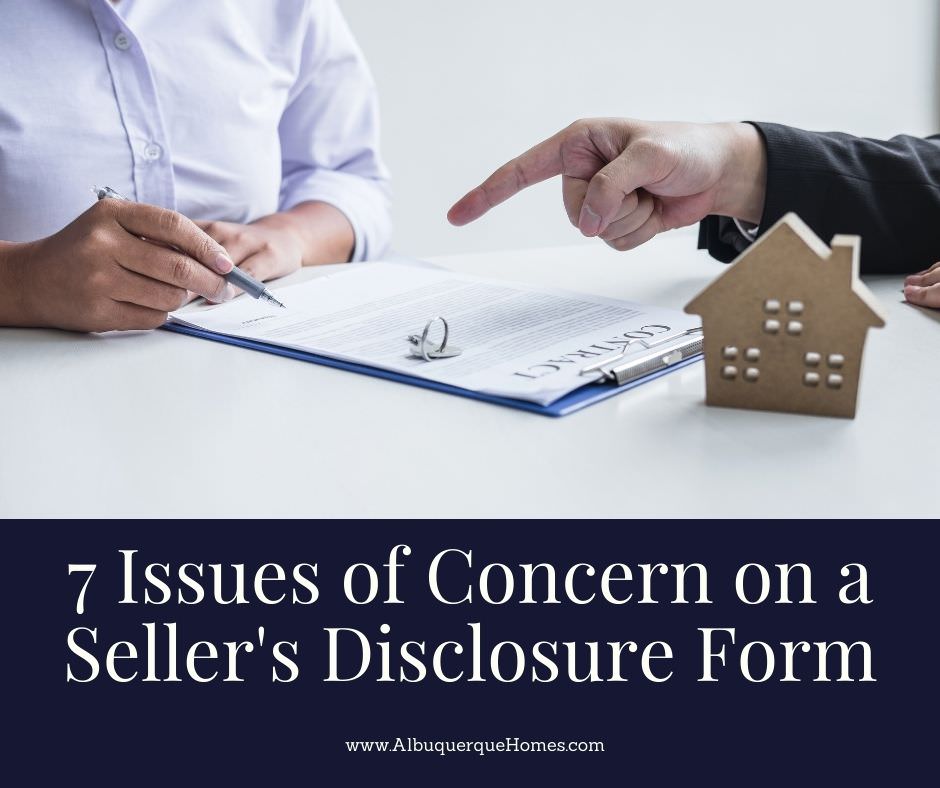7 Issues of Concern on a Seller’s Disclosure Form
When a property owner decides to list and sell their property they must fill out a seller’s disclosure form. This is to inform the buyer of any and all known issues, construction problems, additions, remodels, and anything that may have caused damage to the home while the homeowner has owned the property or that they know about. It’s a great way for buyers to get a clear snapshot of the integrity of the house and property. This is definitely something that all buyers should go over carefully and ask any questions that might come up to the agent or their buyer’s agent.
A typical disclosure report will discuss features of the property such as appliances, roof, foundation, structural components, electrical, plumbing, sewer or septic, HVAC and mechanical systems, natural hazards, zoning, and any environmental hazards depending on the age of the home.
Older homes may also have information about lead, asbestos, mold, radon, or contaminations by use as a meth lab. Some disclosure forms may also cover legal issues such as ownership problems and disputes.
Sellers are responsible for disclosing any and all information within their personal knowledge. This doesn’t mean that they need to hire an inspector to find issues they don’t know about. This is only information that they are aware of.
If you’re buying a new construction home, obviously there won’t be much information to disclose but they still should tell you information about the type of soil, any previous uses of the property and possible future development.
When looking over a seller’s disclosure form, here are 7 issues of concern:
#1. Lead
If you are buying a home that was built prior to 1978, federal law requires the seller to give buyers a form disclosing whether there might be lead-based paint in the house. However, most homeowners don’t even know if the home has lead-based paint unless they personally put it up prior to 1978. So chances are, by 2020, if you’re buying an older home, there probably is led but the previous homeowner cannot guarantee it.
#2. Asbestos
Asbestos can be a huge problem, but really only when you try and remove it. Older homes that have popcorn ceilings or asbestos in the walls may be perfectly safe as long as it is not disturbed. If you’re planning on a remodel in the future, however, you’ll want this material professionally removed.
#3. Hazards
If the home is at an increased risk of damage from any natural disaster or potential environmental contamination, sellers may be required to disclose this information. This might be radon, underground pits, buried tanks, sliding or settlement, or any other earth stability defects.
#4. Additions or major remodels
Sellers are required to reveal and disclose any additions or remodels that either they made or that they are aware of. Buyers have the authority to check any permits and to verify that any work done is up to code. The seller’s disclosure form must reveal any and all renovations.
#5. Major repairs.
Sellers are also required to reveal any repairs that they have conducted or previous repairs from water damage, storm damage, or typography damage. Sellers must disclose that any hazards or damage was taking care of.
#6. Foundation issues
Foundation issues can be one of the more expensive items to repair and can impact the entire livability of a home. If the foundation is shifting, crumbling, or cracking, this could be well beyond the repair and maintenance budget of a new homeowner. It’s important to double-check these items and have them repaired, fixed, or replaced before moving in.
#7. Mold.
If the home has undergone major repairs due to mold or mildew, the seller’s disclosure form should state this. They must also state if the issue has been taken care of and that there have been no additional issues.
You might think that sellers would lie on items like these to avoid having additional costs or even losing the sale but there are penalties for sellers the failure to disclose these items. If the seller doesn’t provide the form or doesn’t fill it out completely and honestly, some states can charge monetary penalties to sellers who violate this law. Even though sellers are not the one to go digging up issues that they may not know about, it is an important step in the home buying process that buyers should be aware of.
Other issues that may be on certain seller’s disclosure forms but not in the state of New Mexico are death, homicide, or paranormal activity. This is a protected class and is not required to be disclosed.
If you have certain questions about the quality of the property, it’s always a good idea to ask but again, I strongly recommend having a home inspection completed so that you understand as much about the property as possible.
More Tips for Buying and Selling Real Estate
- 5 Questions to Ask at the Home Inspection
- Common Things to Look For When Buying a Dream Home
- Hidden Costs of New Construction
- Valuable Tips for First Time Home Buyers
- 10 Things to Look for in a Neighborhood When Buying
- How to Add Curb Appeal to a Deck
- 5 Steps to an Easy Downsize
[NEXForms id=”3″ ]

